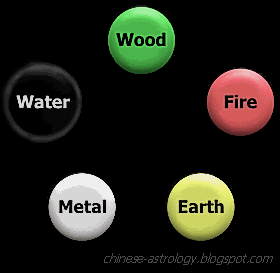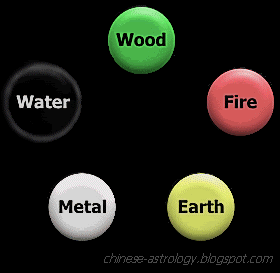Elements, called 五行 「Wu Xíng 」, represent the processes that are fundamental to the
cycles of nature. The chinese term 行 means the change and development of one thing
acting upon another. The 5 Elements are abstractly represented in nature in various forms :-
Metal 金 「Jīn 」 - stands for mineral, iron, jewellery; anything hard.
Water 水 「Shui 」 - stands for anything in liquid form or anything cold.
Wood 木 「Mù 」 - stands for tree, plant; anything to do with wood.
Fire 火 「Huo 」 - stands for fire, sun, heat, light; anything hot.
Earth 土 「Tu 」 - stands for soil, ashes, dust, ground or land.

The concept of the 5 Elements or Phases describes both a Generating Cycle
and an Overcoming Cycle of interactions between the phases.
Generating Cycle 相生 「Xiāng Shēng 」 - describes the interaction of the
Five Elements where one Element generates or produces the next one.

Water generates Wood - We water plants (Wood) to make them grow.
Wood generates Fire - Wood burns easily and gives rise to Fire.
Fire generates Earth - When things are burnt, what is left are ashes (Earth).
Earth generates Metal - Earth helps minerals (Metal) to form.
Metal generates Water - Metal can hold Water. Heated metal produces liquid.

The problem is, the Elements would keep on growing indefinitely. Some mechanism in needed
to control such unchecked growth. The next cycle, the Overcoming Cycle, provides just such
a control. These two cycles provide a balance necessary for normal growth and development.
Overcoming Cycle 相克 「Xiāng Kè 」 - expresses the relationship where
one Element exerts control, suppresses or inhibits another Element.

Water overcomes Fire - Water extinguishes Fire.
Fire overcomes Metal - Fire melts Metal.
Metal overcomes Wood - Axe cuts Wood.
Wood overcomes Earth - Plants extracts nutrients from the
ground and breaks the ground after taking root.
Earth overcomes Water - Earth can absorb Water or stop the flow of Water.
Thus, an example of Yin-Yang Balance is this :
Wood overcomes Earth --> Earth generates Metal --> Metal overcomes Wood
木克土﹝相克 Overcome﹞----> 土生金﹝相生 Generate﹞----> 金克木﹝反克 Subdue﹞
Which means, all 3 elements, Wood, Earth and Metal are able to exist in harmony.

The 5 Elements have their own Yin and Yang aspects. The changes and
development of the 5 Elements are slow and stable when in balance, and
unstable and unpredictable when the balance is disturbed.
Yin-Yang Imbalance - When the acted-upon Element is too strong (excess Yang),
or the acting Element too weak (excess Yin), the 'natural' order is temporarily reversed.

Water can extinguish Fire, but Fire can evaporate Water.
Earth can absorb Water, but Water can cover the land.
Wood can break the ground, but Earth can bury Wood.
Metal can cut Wood, but Metal can become blunt before breaking Wood.
Fire can melt Metal, but Fire can be extinguished before it melts Metal.

Five Elements in 《Zi Wei Dou Shu》
Above-written are only the basics of the Five Elements. However, it is not thorough enough
to be applied to Zi Wei Dou Shu. Five Elements concepts are used extensively in interpreting
of ZWDS charts. From stars to palaces, the Elements have to be taken into account. In fact,
almost all branches of Chinese fortune-telling are based on Yin/Yang and Five Elements
concepts, so without fully comprehending these concepts, it is difficult to understand
what Zi Wei Dou Shu is about, let alone see the wisdom and miracle of ancient Chinese.
I will cover the Five Elements more in-depth when we reach Interpreting of Charts.


